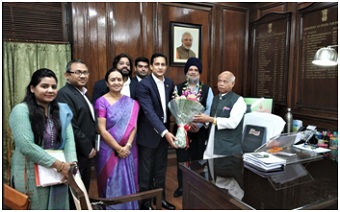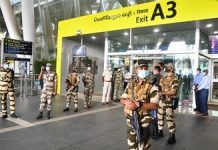A delegation led by the Advisor FICCI’s PSI Committee Ms. Manjari Jaruhar, IPS (Retd) and the Chair Mr. Rituraj Sinha along with senior few other industry leaders and FICCI officials met Mr. Shiv Pratap Shukla, the Hon’ble Minister of State for Finance who looks after the topic of the Goods & Services Tax. The objective of the delegation was to submit a plea to the minister to lessen the 18% Goods & Services Tax (GST) that is being currently levied on the manned guarding and other security services.
The security industry is a large and expanding area of the economy. The private security industry in India is still nascent and is likely to see exponential growth both in terms of manpower employed and market share due to rapid infrastructure and economic development, leading to an increased need for prevention, detection, and protection of assets and citizens.
The private security industry is one of the largest employers in India and is continuously growing. The private security industry employs a large number of people as security guards (employees), who mainly belong to families’ presently below the poverty level and which are significant in number (exceeding 5 million), thereby providing means of livelihood to them.
There are over 10,000 Private Security Agencies (PSA) operating, who are mainly Small and Medium Enterprises (SME) and who are already struggling with low margins and cash flow problems due to their payments getting stuck with their clients and their having to pay the salaries to their guards as well as meeting their statutory obligations, including the depositing the 18% GST with the government out of their pockets. The small agencies are reeling under this huge burden.
Security service industry needs a lower tax structure because of the nature of the business. In the current scenario, the pass-through nature of costs which accounts for approximately 90% of the revenues are wages which are paid by the customer and are a direct pass through to the workforce. In view of the above and based on the Central Goods & Services Tax Act, 2017 (CGST Act) and Integrated Goods & Services Act, 2017 (IGST Act) and allied Rules issued, the Private Security Agencies made this representation on the issues which would not only significantly reduce the compliance burden on the PSAs but also benefit the government by increasing the tax collections and provide administrative relief to the Industry at large.
On behalf of the Industry, FICCI submitted its recommendations to the Minister, urging him to consider revising the GST rate and its the method of its imposition to address the many issues that beset the viability of Private Security Industry (PSI).
The delegation sought relief from the minister by submitting three possible solutions.
Solution #1
Government to impose GST only on the service charge component (10%) charged by the Private Security Agencies rather than, the current 18% GST that is charged on the full invoice value.
The PSI operates on a ‘cost-plus’ pricing model. A basis of ‘per-head-cost’ should be calculated by taking the applicable minimum wage and statutory obligations like PF, ESIC, Leave, Bonus, Gratuity etc. of the employee into account. Private Security agencies typically charge 10% or less as their Service Charge on the above-mentioned cost structure. Therefore, charging GST on the full invoice value results in actually taxing (charging GST) on even the statutory payouts to the employees. And, with end customers paying the agencies typically in 90 to180 days, this leads to significant cash flow pressures on SME agencies who do not have deep pockets and thereby may often default on their statutory compliances.
Charging GST on 10% of invoice value would not only enhance compliance but would also ease the pressure on thousands of SMEs in the private security sector.
Solution #2
The government should consider shifting the obligation to discharge the GST to the recipient of services.
The obligation of GST compliance should be shifted from PSAs to the Service Users. This would significantly ease the cash flow pressure and the risk of default by the PSAs operating under a high-interest rate burden in a low margin business. This shall add to ease of doing business for over 15,000 MSME operating in private security sector.
The change cited above shall also lead to timely GST compliance and eliminate the possibility of leakage of revenue for the Government.
Solution #3
The government should reduce GST on services such as manned guarding, cash logistics, security training, and security consulting provided by the private security agencies and other organisations from the current GST rate of 18% to 5%.
The PSI has emerged as an essential services sector that supports the government machinery in homeland security activities. A reduction in the GST rate is shall boost the volume of work orders thereby paving way for demand expansion and the resultant increase in skill development activities as well as employment generation by private security sector, while significantly resulting in better statutory compliance by smaller agencies to finally increase government revenues, thereby creating a win-win situation for all constituents.








